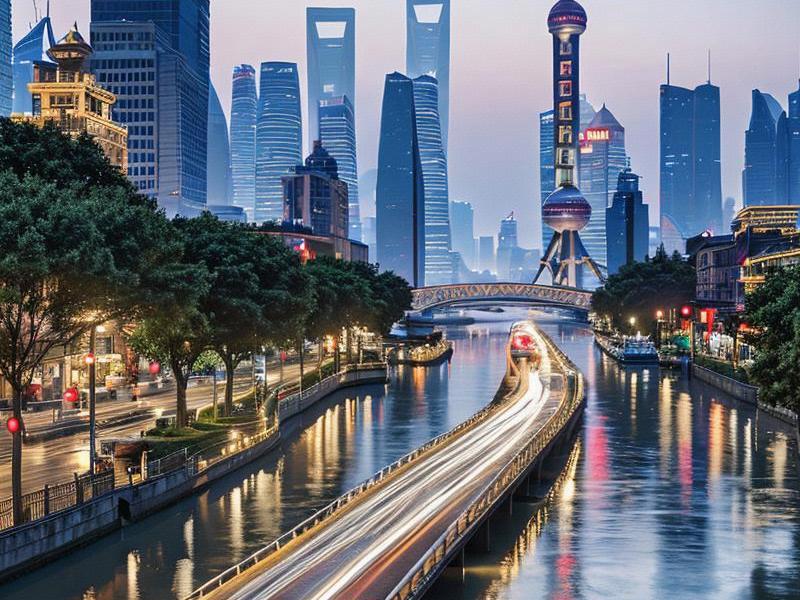Shanghai, a vibrant city on the banks of the Huangpu River, has long been a symbol of China's modernization and a global hub for finance, trade, culture, and innovation. This article delves into the multifaceted aspects of Shanghai, exploring its historical evolution, economic prowess, cultural vibrancy, and future prospects.

Shanghai, often referred to as the "Pearl of the Orient," is a city that seamlessly blends tradition with modernity. Its rich history dates back to the 11th century, but it was during the 19th century that Shanghai began to transform into a global metropolis. The opening of treaty ports after the First Opium War brought an influx of foreign influence, leading to the establishment of the International Settlement and the French Concession. This period of colonial history left a lasting architectural legacy that can still be seen today in areas like the Bund and the French Concession.
The economic rise of Shanghai is nothing short of remarkable. In the late 20th century, China's economic reforms and opening-up policies positioned Shanghai as a key player in the country's development. The establishment of the Pudong New Area in 1990 marked a new era for Shanghai, with the construction of iconic landmarks such as the Oriental Pearl Tower, the Jin Mao Tower, and the Shanghai Tower, which now dominate the city's skyline. These developments have cemented Shanghai's status as a global financial center, rivaling cities like New York and London.
Shanghai's economy is diverse, with key sectors including finance, trade, manufacturing, and technology. The city is home to the Shanghai Stock Exchange, one of the largest in the world, and the Pudong area has become a hub for multinational corporations and financial institutions. The city's port, the Port of Shanghai, is the busiest container port globally, handling billions of tons of cargo annually. This economic dynamism has attracted millions of residents and visitors, making Shanghai one of the most populous cities in the world.
Culturally, Shanghai is a melting pot of influences. The city's history of foreign concessions has left a rich tapestry of architectural styles, from Art Deco to Gothic, that coexist with traditional Chinese structures. The Bund, a waterfront area along the Huangpu River, is a showcase of this architectural diversity, offering stunning views of the modern skyline across the river in Pudong.
夜上海最新论坛
Shanghai's cultural scene is thriving, with numerous museums, galleries, theaters, and music venues. The Shanghai Museum is renowned for its extensive collection of Chinese art, while the Power Station of Art, a former power plant turned contemporary art museum, hosts cutting-edge exhibitions. The city's theaters and concert halls attract world-class performers, making Shanghai a cultural hotspot.
The culinary scene in Shanghai is equally diverse, reflecting the city's history and population. Peking duck, Sichuan hot pot, and Cantonese dim sum are just a few of the dishes that can be found in the city's many restaurants. However, Shanghai's own culinary traditions, such as xiaolongbao (soup dumplings) and shengjianbao (pan-fried buns), are must-tries for visitors.
Shanghai's urban development is a model of modern city planning. The city has invested heavily in infrastructure, transportation, and green initiatives. The Shanghai Metro system is one of the most extensive in the world, providing efficient and convenient public transportation for millions of residents. The city's green spaces, such as Century Park and Zhongshan Park, offer residents and visitors a chance to escape the urban hustle and bustle.
上海龙凤论坛419
In recent years, Shanghai has also been at the forefront of China's innovation and technology sectors. The Zhangjiang Hi-Tech Park is a hub for research and development, attracting top talent and fostering innovation in fields such as biotechnology, information technology, and new energy. The city's commitment to sustainability is evident in its efforts to reduce carbon emissions and promote green technologies.
Shanghai's global influence extends beyond its economic and cultural achievements. The city has played a pivotal role in international diplomacy, hosting major summits and events such as the G20 Leaders' Summit and the World Expo in 2010. These events have showcased Shanghai's ability to host large-scale international gatherings and its commitment to global cooperation.
Looking ahead, Shanghai is poised for continued growth and development. The city's master plan aims to enhance its status as a global financial center, a hub for innovation, and a model of sustainable urban development. Initiatives such as the construction of the Hongqiao International Airport and the expansion of the Shanghai Free-Trade Zone are expected to further boost the city's economy and global connectivity.
419上海龙凤网
Shanghai's future also lies in its ability to balance rapid urbanization with the preservation of its cultural heritage and environmental sustainability. The city's leadership is committed to creating a livable and sustainable urban environment for its residents, ensuring that Shanghai remains a vibrant and attractive place to live, work, and visit.
In conclusion, Shanghai is a city that embodies the spirit of China's modernization and global aspirations. Its rich history, economic prowess, cultural vibrancy, and commitment to innovation make it a unique and dynamic metropolis. As Shanghai continues to grow and evolve, it will undoubtedly remain a key player on the global stage, shaping the future of China and the world.